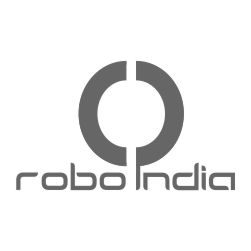This tutorial of Robo India explains, how to use DS18B20 Temperature Sensor with Arduino.
1. Introduction:
This module is used to measure temperature. DS18B20 are one wire bus protocol, which requires only one data line for communication with Arduino.

1.1 Features:
1. Measures temperature from -55 degree C to 125 Degree C.
2. 0.5°C Accuracy from -10°C to +85°C
3. Programmable Resolution from 9 Bits to 12 Bits
4. No external components required.
5. Unique one wire interface which requires only one port for communication
2. Hardware required
| S.No. | Item | Quantity |
| 1. | Arduino | 1 |
| 2. | Breadboard | 1 |
| 3. | DS18B20 Temperature Sensor | 1 |
| 4. | Resistor 4.7K | 1 |
| 5. | Male to male Jumper | 3 |
3. Circuit Diagram
Make the following connections with Arduino-

4. Library File
Following library will be required to run this sketch. Download the zip file extract the same and copy this to your Arduino library folder.
This library file should be placed at the install folder of Arduino. I have a 64 bit Win7 OS and my Arduino library folder address is located at
C:\Program Files (x86)\Arduino\libraries
You may download library file from here.
5. Programming
You may download this Arduino Sketch from here.
#include <OneWire.h>
OneWire ds(10); // on pin 10 (a 4.7K resistor is necessary)
void setup(void)
{
Serial.begin(9600);
}
void loop(void)
{
byte i;
byte present = 0;
byte type_s;
byte data[12];
byte addr[8];
float celsius, fahrenheit;
if ( !ds.search(addr)) {
Serial.println("No more addresses.");
Serial.println();
ds.reset_search();
delay(250);
return;
}
Serial.print("ROM =");
for( i = 0; i < 8; i++) {
Serial.write(' ');
Serial.print(addr[i], HEX);
}
if (OneWire::crc8(addr, 7) != addr[7]) {
Serial.println("CRC is not valid!");
return;
}
Serial.println();
// the first ROM byte indicates which chip
switch (addr[0]) {
case 0x10:
Serial.println(" Chip = DS18S20"); // or old DS1820
type_s = 1;
break;
case 0x28:
Serial.println(" Chip = DS18B20");
type_s = 0;
break;
case 0x22:
Serial.println(" Chip = DS1822");
type_s = 0;
break;
default:
Serial.println("Device is not a DS18x20 family device.");
return;
}
ds.reset();
ds.select(addr);
ds.write(0x44, 1); // start conversion, with parasite power on at the end
delay(1000); // maybe 750ms is enough, maybe not
// we might do a ds.depower() here, but the reset will take care of it.
present = ds.reset();
ds.select(addr);
ds.write(0xBE); // Read Scratchpad
Serial.print(" Data = ");
Serial.print(present, HEX);
Serial.print(" ");
for ( i = 0; i < 9; i++) { // we need 9 bytes
data[i] = ds.read();
Serial.print(data[i], HEX);
Serial.print(" ");
}
Serial.print(" CRC=");
Serial.print(OneWire::crc8(data, 8), HEX);
Serial.println();
// Convert the data to actual temperature
// because the result is a 16 bit signed integer, it should
// be stored to an "int16_t" type, which is always 16 bits
// even when compiled on a 32 bit processor.
int16_t raw = (data[1] << 8) | data[0];
if (type_s) {
raw = raw << 3; // 9 bit resolution default
if (data[7] == 0x10) {
// "count remain" gives full 12 bit resolution
raw = (raw & 0xFFF0) + 12 - data[6];
}
} else {
byte cfg = (data[4] & 0x60);
// at lower res, the low bits are undefined, so let's zero them
if (cfg == 0x00) raw = raw & ~7; // 9 bit resolution, 93.75 ms
else if (cfg == 0x20) raw = raw & ~3; // 10 bit res, 187.5 ms
else if (cfg == 0x40) raw = raw & ~1; // 11 bit res, 375 ms
//// default is 12 bit resolution, 750 ms conversion time
}
celsius = (float)raw / 16.0;
fahrenheit = celsius * 1.8 + 32.0;
Serial.print(" Temperature = ");
Serial.print(celsius);
Serial.print(" Celsius, ");
Serial.print(fahrenheit);
Serial.println(" Fahrenheit");
}
6. Output
After Uploading the code, open the serial monitor.

If you have any query please write us at support@roboindia.com
Thanks and Regards
Content Development Team
Robo India
https://roboindia.com
